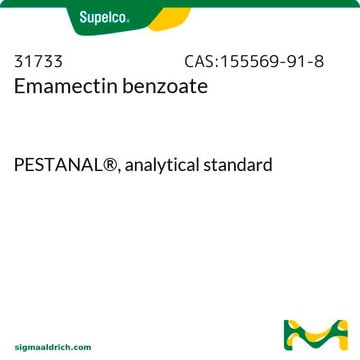33969
Indoxacarb
PESTANAL®, analytical standard
Synonym(s):
Methyl 7-chloro-2,5-dihydro-2-[N-(methoxycarbonyl)-4-(trifluoromethoxy)anilinocarbonyl]indeno[1,2-e][1,3,4]oxadiazine-4a(3H)carboxylate
About This Item
Recommended Products
grade
analytical standard
Quality Level
description
mixture of isomers
product line
PESTANAL®
shelf life
limited shelf life, expiry date on the label
technique(s)
HPLC: suitable
gas chromatography (GC): suitable
application(s)
agriculture
environmental
format
neat
SMILES string
COC(=O)N(C(=O)N1CO[C@]2(Cc3cc(Cl)ccc3C2=N1)C(=O)OC)c4ccc(OC(F)(F)F)cc4
InChI
1S/C22H17ClF3N3O7/c1-33-18(30)21-10-12-9-13(23)3-8-16(12)17(21)27-28(11-35-21)19(31)29(20(32)34-2)14-4-6-15(7-5-14)36-22(24,25)26/h3-9H,10-11H2,1-2H3/t21-/m0/s1
InChI key
VBCVPMMZEGZULK-NRFANRHFSA-N
Looking for similar products? Visit Product Comparison Guide
General description
Application
Legal Information
Signal Word
Danger
Hazard Statements
Precautionary Statements
Hazard Classifications
Acute Tox. 3 Oral - Acute Tox. 4 Inhalation - Aquatic Acute 1 - Aquatic Chronic 1 - Skin Sens. 1B - STOT RE 1
Target Organs
Blood,Nervous system,Heart, Heart,Nervous system,Blood system
Storage Class Code
6.1C - Combustible acute toxic Cat.3 / toxic compounds or compounds which causing chronic effects
WGK
WGK 3
Flash Point(F)
Not applicable
Flash Point(C)
Not applicable
Personal Protective Equipment
Choose from one of the most recent versions:
Already Own This Product?
Find documentation for the products that you have recently purchased in the Document Library.
Customers Also Viewed
Our team of scientists has experience in all areas of research including Life Science, Material Science, Chemical Synthesis, Chromatography, Analytical and many others.
Contact Technical Service

















